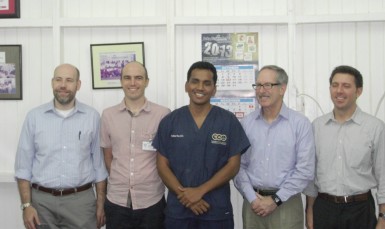Improved ambulance services countrywide are being planned for the start of next year, with trained drivers and Emergency Medical Technicians (EMTs) to administer care to patients en route to the hospital.
This is according to Zulfikar Bux, the newly-appointed Head of Department for Accident & Emergency at the Georgetown Public Hospital Corporation (GPHC), who made the disclosure during a press meeting held yesterday morning at the GPHC.
“EMTs with excellent skills will be able to respond to more and more emergencies so that eventually

the public should expect an expert on the scene…so that care can begin at the scene by trained personnel,” said Corey Slovis, Vanderbilt University’s Chairman of the Department of Emergency Medicine, who was also present at the meeting.
Bux stated that the success of this proposed plan will rest on linking equipment, communicative systems, and human personnel. He went on to say that this initiative will hopefully begin by the end of January 2014.
Bux was appointed the department head due to his completion of a three-year GPHC Masters Pro-gramme in Emergency Medicine. Bux, who hopes that his new position will afford him with the opportunity to improve the functioning of the hospital, was also optimistic that the programme will benefit not just the GPHC, but the entire country. These benefits are expected to include improvements in emergency management of patients, turnover time, and diagnostics.
The programme, which was supervised by faculty from Vanderbilt University in Nashville, Tennessee, was free of cost to the 11 GPHC resident doctors and saw Bux as its first graduate.
The next batch of students will graduate next year November.
The programme has become a regional one and has already housed one Antiguan, who will return to her country to provide emergency medicine. Based on recent applications process, it is anticipated that the programme will see the admission of other applicants from the region.
Three emergency nurses from Vanderbilt University are also teaching a course in critical care pharmacology at the GPHC.
The programme is also expected to yield improved stabilisation of patients. Before the programme, the incubation and placing of patients on life support were the responsibility of the Intensive Care Unit (ICU) doctors.
Now, any of the residents in the training programme will be able to take over these tasks.
A stat laboratory has already been established in the emergency room and is being used to decrease the waiting time for patients in the hospital.
Bux emphasised that the initiative is not only about medical training but also about administrative training and the unification of the two.




